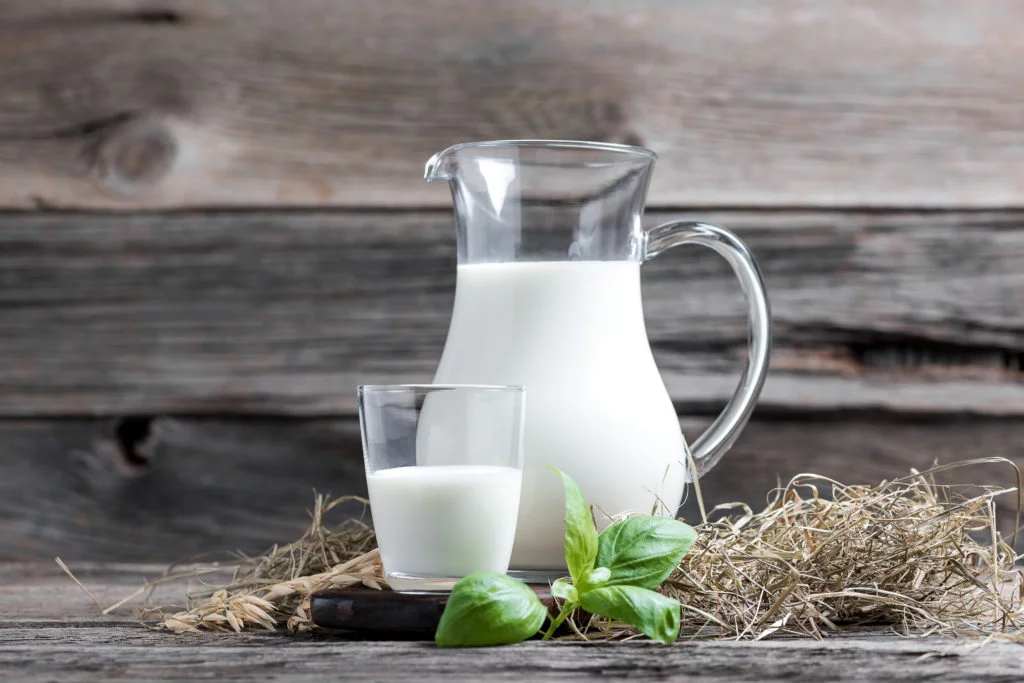- What are the Benefits of Oat Milk?
- What are the Drawbacks of Oat Milk?
- What to Look for in a High-Quality Oat Milk?
- Best Oat Milk Products With the Cleanest Ingredients
- Willa’s Organic Oat Milk
- 361 Organic Oatsome Oat Milk
- RISE Brewing Co. Organic Oat Milk
- Better Than Milk Organic Oat Milk
- Pacific Foods Organic Oat Milk
- Oatly Organic Oat Drink
- Bottom Line: Is Oatmilk Good for You?
As more and more people turn to dairy-free and lactose-free milk options, oat milk has become a trendy alternative. But with many products like oat milk that demand extensive processing, there’s cause for concern around the transparency of ingredients and production methods being used. Although devoid of dairy–one of the most common food sensitivity triggers–some people find they have allergies or intolerances to the ingredients in plant-based milk, including oats, nuts, and soy.
This begs the frequently asked question, “Is oat milk good for you?†No doubt, oat milk has several benefits that make it an inviting option for those seeking plant-based milk. Not to mention, it’s a barista’s favorite dairy alternative for lattes and coffee drinks, provided its thicker, creamier, and frothier qualities. Oat milk’s flavor profile is also welcomingly neutral, slightly nutty, and mild, offering a versatile choice that’s not overpowering.
With many processed products, finding the best oat milk that’s clean and free from low-quality ingredients can be like finding a needle in a haystack. Many oat milk products contain a host of gums, seed oils, and questionable additives that make it important to know what to look for. Here, we peel apart the question of whether or not oat milk is good for you, its benefits and drawbacks, and what products top the charts as the best oat milk options in the US.
What are the Benefits of Oat Milk?
Oat milk was first developed in Sweden in the 1990s by Rickard Öste, a food science professor at Lund University, who later founded the oat drink company Oatly. Unlike traditional oat milk, which is made by soaking oats in water and blending the mixture, Oatly developed an industrial process that breaks oat starches down with enzymes and separates the bran from the oats, maintaining its macronutrient profile and improving the milk’s texture.
Commercial oat milk gained popularity quickly in Europe and later in America, leading to an oat milk shortage due to high demand. The demand for oat milk has been so significant that it has surpassed soy milk sales in the United States, becoming the second-largest plant milk after almond milk. Oat milk is now available in many countries under various brands and has been used in various products, including coffee creamer, yogurt alternatives, ice cream, and chocolate.
The benefits of oat milk encompass both health and sustainability aspects, making it a popular choice among various consumer groups. Here’s a detailed look at these benefits based on the provided sources:
- Vegan and allergen-free: Oat milk is free from common allergens such as lactose, soy, and nuts, making it suitable for people with allergies or intolerances. It also offers a plant-based alternative to dairy milk for those on a vegan diet.
- Nutrient-rich: Most oat milk products are fortified with essential vitamins and minerals, including B vitamins, calcium, and vitamin D, which support bone health and may contribute to lowering cholesterol. B vitamins are crucial for energy metabolism and maintaining healthy red blood cells.
- Fiber content: Oat milk is high in soluble fiber, particularly beta-glucan, which has been associated with heart health benefits, such as lowering cholesterol levels.[1] Fiber also supports digestive health and may help regulate blood sugar levels.
- Low in saturated fats: Compared to cow’s milk, oat milk replaces saturated fats with unsaturated fats, which are healthier for the heart. It contains minimal fat per serving, making it a low-calorie option.
- Cholesterol-free: Regular consumption of oat milk may help lower bad cholesterol (LDL) in the blood, reducing the risk of cardiovascular disease.[2]
- Regulates blood sugar levels: The beta-glucan in oat milk slows down the absorption of carbohydrates, providing a steadier supply of sugar into the bloodstream, which is beneficial for managing diabetes.[3]
- Environmental impact: Switching from dairy to oat milk can help reduce the consumption of animal products and the environmental impact on one’s diet. Oat milk production is generally associated with lower greenhouse gas emissions, water usage, and land use compared to dairy milk.[4] Oats also require less than 15% of the water needed to grow, on average, than almonds, according to the Water Footprint Network.
- Culinary versatility: Oat milk is versatile and can be used in various culinary applications, including coffee, soups, and cereals, without significantly altering the flavor profile.
While oats are naturally gluten-free, it’s important to recognize that some oat milks are made in facilities that handle gluten-containing grains, leading to cross-contamination. For those with celiac disease or gluten sensitivity, it’s critical to choose oat milk labeled as certified gluten-free.[5]
What are the Drawbacks of Oat Milk?
Despite its benefits and desirable qualities as a dairy-free milk option, oat milk has its fair share of drawbacks. Among the most concerning include:
- Sugar and blood sugar: Not only can oat milk have a high sugar content due to additives, but the process of turning oats into oat milk involves the use of enzymes that break down the oat starches into sugars, resulting in a high-glycemic product that can spike blood sugar levels.
- Low protein levels: Compared to cow’s milk and other plant-based alternatives, oat milk generally contains lower levels of protein. This could be a drawback for individuals relying on oat milk as a primary source of protein.
- Additives and fats: Many commercial oat milk brands include additives and seed oils like canola oil, safflower seed oil, or rapeseed oil to enhance texture and taste. These additives and high-fat content can contribute to increased calorie intake, and weight gain if consumed in excess, and are correlated with inflammation and free radical production.
- Glyphosate contamination: The sources indicate that non-organic oats are widely sprayed with the herbicide glyphosate, also known as Roundup. Glyphosate is classified as a probable human carcinogen by the World Health Organization and has been linked to various health issues like cancer, neurological diseases, and endocrine disruption.[6]
- Mycotoxin and heavy metal contamination: The testing done by Mamavation found detectable levels of heavy metals like arsenic in some popular oat milk brands. Similarly, oats used in oat milk production are at high risk of growing mold and producing mycotoxins like ochratoxin A (OTA). OTA has been found to exceed safety limits in many oat-based products and has been linked to health problems.
While oat milk has several benefits, including being a lactose-free and vegan-friendly option, there are various nutritional and environmental factors that consumers should consider. Making an informed choice involves weighing these pros and cons based on individual dietary needs and environmental concerns.
What to Look for in a High-Quality Oat Milk?
So, is oat milk good for you? Well, it depends. Certain products outperform others in terms of their quality. Here are some general tips on what to look for in the best oat milk products.
- Organic: Choose oat milk that is certified organic to ensure it is grown without the use of synthetic pesticides, herbicides, or fertilizers.
- Non-GMO: Opt for oat milk that is non-GMO certified to ensure it is made from non-genetically modified oats.
- Glyphosate-free: Look for oat milk that is certified glyphosate-free or made from oats grown without glyphosate, as this herbicide has been linked to health issues.
- Minimal added sugar: Choose oat milk with minimal added sugar, as high sugar content can negatively impact blood sugar levels and overall health.
- Whole grain oats: Opt for oat milk made with whole grain oats, which contain more fiber and help slow down the absorption of carbohydrates, providing a steadier supply of sugar into the bloodstream.
- No gums, lectins, or emulsifiers: Avoid oat milk with added gums, lectins, or emulsifiers, as these can have negative health effects and are not necessary for the production of oat milk.
- Shelf-stable or refrigerated: Choose oat milk that is either shelf-stable or refrigerated, depending on your preference and storage capabilities.
- Environmentally sustainable: Consider the environmental impact of oat milk production, such as water usage and carbon emissions, and choose brands that prioritize sustainability.
- Taste and texture: Finally, consider the taste and texture of the oat milk, as this can impact your overall enjoyment and willingness to incorporate it into your diet.
It’s essential to read the product labels and research the brands to ensure they meet your specific preferences and requirements. To help give you a head start, below are some of the best oat milk products we recommend.
Best Oat Milk Products With the Cleanest Ingredients
Finding quality oat milk with clean ingredients can be challenging. In short, the perfect oat milk is hard to come by; however, many products come close to checking all of the boxes. Among those, here are some of the best oat milk products worth your money.
Willa’s Organic Oat Milk
Willa’s Oat Milk is organic, shelf-stable, and made from whole-grain oats. It contains no added sugar, gums, binders, or oils. Willa’s Organic Oat Milk is also vegan and non-GMO certified, with a remarkably simple ingredients list containing only organic oats, water, and sea salt. Free from additives commonly found in many commercial oat milk brands, Willa’s Organic Oat Milk is an excellent choice for those monitoring their sugar intake or seeking a minimally processed plant-based milk alternative.
Importantly, Willa’s Oat Milk is also certified glyphosate-free, meaning the oats used are not contaminated with this controversial herbicide. Additionally, the use of whole-grain oats provides more fiber and a slower absorption of carbohydrates compared to products made with processed oats. Willa’s Oat Milk is vegan, shelf-stable, and even formulated to steam and froth well for coffee drinks, making it a versatile and high-quality option for health-conscious consumers.
361 Organic Oatsome Oat Milk
361 Organic Oatsome Oat Milk is made with a simple, transparent ingredient list that includes organic oats, organic sunflower oil, sea salt, calcium carbonate, riboflavin, vitamin D, and vitamin B12. This formulation avoids the use of any added sugars, gums, binders, or other questionable additives frequently found in mainstream oat milk products.
Beyond the clean ingredient list, 361 Organic Oatsome Oat Milk is also certified organic and glyphosate-free, providing additional assurance of its quality and sustainability. This shelf-stable oat milk can be conveniently stored and used in a variety of applications, from beverages to cooking and baking. The added vitamins and minerals further enhance the nutritional profile of this oat milk.
361 Organic Oatsome Oat Milk distinguishes itself as one of the best options on the market due to its commitment to using high-quality, organic ingredients, while avoiding common additives and preservatives. This makes it an excellent choice for health-conscious consumers seeking a nutritious and versatile plant-based milk alternative.
RISE Brewing Co. Organic Oat Milk
RISE Brewing Co.’s Organic Oat Milk stands out as an excellent choice for health-conscious consumers seeking a clean, versatile, and delicious plant-based milk alternative. The ingredients include only organic oats, water, and sea salt. In turn, it’s devoid of added sugars, oils, gums, and binders. The use of certified organic, non-GMO oats ensures the product is free from glyphosate and other potential contaminants.
RISE Brewing Co. emphasizes the versatility of this oat milk, stating that it can be used for a variety of applications, from cooking and baking to steaming and frothing for coffee drinks. Customers have praised RISE Brewing Co.’s Oat Milk for its great taste and limited ingredient list, with one reviewer describing it as the “only shelf-stable oat milk that compares to the ones available in the refrigerated section.” The company’s commitment to customer satisfaction and responsiveness further adds to the appeal of this high-quality oat milk product.
Better Than Milk Organic Oat Milk
Better Than Milk’s Organic Oat Milk is made with minimal ingredients: organic, gluten-free oats and spring water. This blend is free from added sugars, oils, gums, and texturizers that are commonly found in many commercial oat milk brands. And the use of organic oats ensures the product is free from potential contaminants like glyphosate, a controversial herbicide.
In addition to its organic and gluten-free status, Better Than Milk Organic Oat Milk is also free from dairy, lactose, soy, sulfites, artificial flavors, and carrageenan. This makes it an excellent choice for those with dietary restrictions or sensitivities. The company also prioritizes environmental sustainability, using FSC-certified packaging materials that are recyclable.
Overall, Better Than Milk Organic Oat Milk is a clean-label oat milk option. Its commitment to using simple, organic ingredients without any unnecessary additives or fillers, makes it a top choice for health-conscious consumers seeking a nutritious and versatile plant-based milk alternative.
Pacific Foods Organic Oat Milk
Pacific Foods Organic Oat Milk is another top-tier oat milk option that’s recognized for its thoughtful ingredient selection and desirable characteristics. The use of certified organic oats helps to ensure the product is free from potentially harmful pesticides and contaminants like glyphosate. The company has also taken steps to reduce the sugar content in this oat milk, making it a more suitable option for those monitoring their carbohydrate and sugar intake.
In addition to the organic oats, Pacific Foods’ formula includes other carefully selected ingredients such as gellan gum, sea salt, tricalcium phosphate, vitamin D2, and vitamin A palmitate. While the inclusion of some additives like gums may be a consideration for some consumers, the company has fortified the milk with important vitamins and minerals to enhance its nutritional profile.
One of the standout qualities of Pacific Foods’ Organic Oat Milk is its versatility. The unsweetened, reduced-sugar formulation makes it a suitable choice for a wide range of applications, from drinking on its own to using it in cooking, baking, and even coffee drinks. While it may not be the most minimalist option, Pacific Foods’ focus on providing a nutritious and versatile plant-based milk alternative is commendable.
Oatly Organic Oat Drink
While not traditional oat milk, Oatly’s Organic Oat Drink stands out for its thoughtful ingredient selection and desirable characteristics. It’s made with relatively simple ingredients like water, oats, rapeseed oil, and a few added nutrients and stabilizers. While it is not certified organic, the product is certified glyphosate-free, ensuring the oats used are not contaminated with this controversial herbicide.
Oatly also fortifies its oat drink with important vitamins and minerals like calcium, vitamin D, and vitamin B12, enhancing the overall nutritional profile of the product. One of the key qualities of Oatly’s Organic Oat Drink is its versatility. The company states that it is suitable for a variety of applications. This makes it a flexible and convenient option for health-conscious consumers seeking a quality, plant-based milk alternative.
Bottom Line: Is Oatmilk Good for You?
Oat milk offers obvious benefits as a lactose-free and dairy-free milk substitute that requires less water to produce compared to cow’s milk and other plant-based options like almond and cashew milk. Depending on the brand and ingredients, oat milk is generally cholesterol-free, low in saturated fats, high in fiber, and rich in nutrients, making it a healthier choice of milk compared to most commercial options.
However, like most mainstream food and beverage products, it’s critical to know the potential drawbacks and how to identify high-quality oat milk products that are genuinely good for you. In essence, it’s vital to opt for organic, non-GMO, and overall clean oat milk products that contain fewer gums, fillers, sugar, additives, and potential contaminants.
Scientific References:
- Tosh SM, Bordenave N. Emerging science on benefits of whole grain oat and barley and their soluble dietary fibers for heart health, glycemic response, and gut microbiota. Nutr Rev. 2020 Aug 1;78(Suppl 1):13-20. doi: 10.1093/nutrit/nuz085. PMID: 32728756.
- Ms Wolever T, Rahn M, Dioum E, Spruill SE, Ezatagha A, Campbell JE, Jenkins AL, Chu Y. An Oat β-Glucan Beverage Reduces LDL Cholesterol and Cardiovascular Disease Risk in Men and Women with Borderline High Cholesterol: A Double-Blind, Randomized, Controlled Clinical Trial. J Nutr. 2021 Sep 4;151(9):2655-2666. doi: 10.1093/jn/nxab154. PMID: 34236436.
- Shen XL, Zhao T, Zhou Y, Shi X, Zou Y, Zhao G. Effect of Oat β-Glucan Intake on Glycaemic Control and Insulin Sensitivity of Diabetic Patients: A Meta-Analysis of Randomized Controlled Trials. Nutrients. 2016; 8(1):39. https://doi.org/10.3390/nu8010039
- Yu Y, Li X, Zhang J, Li X, Wang J, Sun B. Oat milk analogue versus traditional milk: Comprehensive evaluation of scientific evidence for processing techniques and health effects. Food Chem X. 2023 Sep 3;19:100859. doi: 10.1016/j.fochx.2023.100859. PMID: 37780279; PMCID: PMC10534225.
- Hoffmanová I, Sánchez D, Szczepanková A, Tlaskalová-Hogenová H. The Pros and Cons of Using Oat in a Gluten-Free Diet for Celiac Patients. Nutrients. 2019 Oct 2;11(10):2345. doi: 10.3390/nu11102345. PMID: 31581722; PMCID: PMC6835965.
- Davoren MJ, Schiestl RH. Glyphosate-based herbicides and cancer risk: a post-IARC decision review of potential mechanisms, policy and avenues of research. Carcinogenesis. 2018 Oct 8;39(10):1207-1215. doi: 10.1093/carcin/bgy105. PMID: 30060078; PMCID: PMC7530464.











